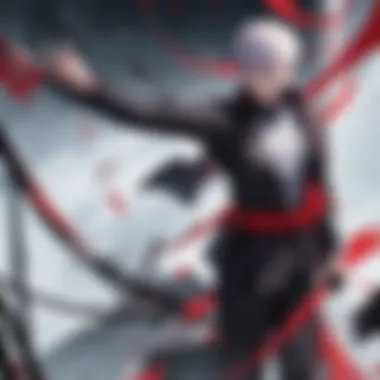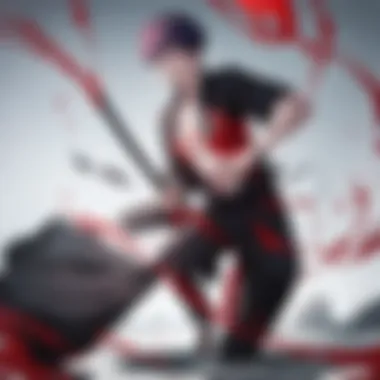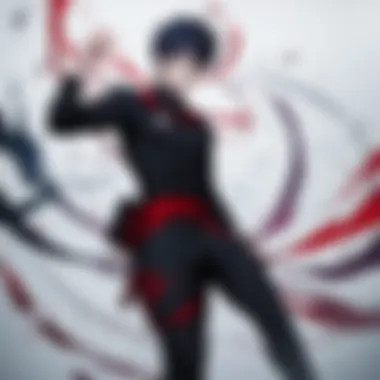An In-Depth Exploration of Jujutsu Kaisen: Episode Guide and Analysis


Intro
Jujutsu Kaisen has gained remarkable popularity in the anime community. Its intricate blend of action, horror, and emotional depth draws viewers in and keeps them engaged. Understanding the show requires more than just watching the episodes; it demands an exploration of its characters, themes, and narrative intricacies. This article offers a detailed overview of all known episodes, which will benefit both seasoned fans and newcomers.
Character Profiles
Overview of Main Characters
At the heart of Jujutsu Kaisen are its compelling protagonists. Yuji Itadori is the main character, whose charismatic personality and insatiable curiosity make him stand out. He becomes a vessel for Sukuna, the series' most infamous curse, giving rise to tension in his journey. Other key figures include Megumi Fushiguro, a stoic and focused jujutsu sorcerer; and Nobara Kugisaki, whose fierce independence and strength reflect her unique character arc.
The interplay among these main characters cultivates a dynamic that enhances the storytelling. Each character faces distinct challenges, enabling profound growth and self-discovery throughout the series.
Supporting Characters
Supporting characters enrich the narrative’s complexity. Satoru Gojo, a powerful mentor, plays a critical role in shaping the protagonists’ paths. His unconventional methods and overwhelming strength bring a unique flavor to the ensemble. Aside from the sorcerers, the curses themselves, like Mahito and Jogo, create an intricate adversarial landscape that challenges the heroes and forces them to evolve.
"Character development is crucial for understanding the deeper meanings within Jujutsu Kaisen," underscores the impact of character arcs.
Theme Exploration
Central Themes
Central themes interwoven throughout Jujutsu Kaisen articulate the human condition, primarily dealing with life, death, and emotional trauma. The embrace of darkness versus light showcases the complexity of morality. This duality is represented not only through the characters but also through their choices, emphasizing that no individual is purely good or evil. In addition, friendship, sacrifice, and legacy are recurring elements that resonate with viewers.
Cultural References
Cultural references enrich the storytelling by connecting modern audiences to deeper Japanese traditions. Jujutsu Kaisen often references the societal implications of curses, reflecting real-world fears and struggles. This juxtaposition illuminates the themes of existential dread and personal responsibility, making the story relatable yet profound.
Closure
Exploring Jujutsu Kaisen reveals a multilayered narrative where character depth and thematic richness play indispensable roles. Understanding these elements enhances appreciation for the series, providing insights into its impact on contemporary anime. This guide offers a comprehensive overview, helping viewers to grasp the intricacies of Jujutsu Kaisen fully.
Intro to Jujutsu Kaisen
Jujutsu Kaisen is not just another addition to the vast world of anime. It represents a confluence of rich narrative elements, nuanced characters, and thematic depth. Understanding this series provides insight not only into its story but also into broader cultural aspects that it reflects and critiques. This article aims to explore the multifaceted nature of Jujutsu Kaisen, starting from its foundation and how it has developed into a cornerstone of contemporary anime.
Overview of the Series


Jujutsu Kaisen follows the journey of Yuji Itadori, a high school student who stumbles into the world of curses and sorcerers. The narrative structure adeptly intertwines action with moments of character development. It is set in a universe where malevolent curses, born from human negative emotions, threaten the fabric of society. This unique premise sets the stage for exploring complex themes, making Jujutsu Kaisen particularly resonant with viewers. The series received acclaim not only for its storytelling but also for its dynamic animation, particularly under the direction of MAPPA.
Background and Adaptation
The adaptation of the Jujutsu Kaisen manga by Gege Akutami is significant because it highlights the evolution from page to screen. The anime premiered in 2020, rapidly gaining a following. The series is based on a blend of traditional shonen elements while incorporating horror and supernatural themes. The source material's popularity paved the way for the anime's high production quality and engaging pacing. This adaptation showcases the intricate relationship between the source material and its animated counterpart, illustrating how an effective adaptation preserves essential narrative components.
Critical Reception
The response to Jujutsu Kaisen has been overwhelmingly positive. Critics consistently praise its animation quality, character development, and thematic depth. The series has garnered several awards, reflecting its place in the competitive landscape of anime. Viewers appreciate how it tackles profound existential themes while maintaining an approachable atmosphere. The character arcs are well-received, as they resonate with audiences, prompting discussions about morality and friendship. Furthermore, the blend of humor with darker elements adds a layer of complexity that engages a diverse viewer base.
"Jujutsu Kaisen stands out in the modern anime landscape for its ability to inject humor into its horror."
In summary, the introduction of Jujutsu Kaisen underscores the importance of understanding the framework on which the series is built. By examining the series through its overview, adaptation background, and critical reception, we begin to unravel the layers that make it a significant work in contemporary anime.
Episode Breakdown
The Episode Breakdown is a crucial segment in this analysis of Jujutsu Kaisen, as it dissects the series episode by episode. This breakdown not only provides a detailed narrative of events but also highlights how these episodes contribute to the overall story arc and character development. Each episode plays a significant role in establishing the tone, pacing, and emotional depth of the series. By breaking down the episodes, readers can better appreciate the intricate storytelling and thematic elements that Jujutsu Kaisen offers. Furthermore, this examination strengthens the connection between the audience and the characters, allowing for a more immersive viewing experience.
Season One Overview
Season One introduces viewers to the world of Jujutsu Kaisen, where curses and sorcery intertwine with the protagonist Yuji Itadori’s journey. This season has a total of 24 episodes, each contributing to a rich tapestry of action, drama, and supernatural elements. The story starts with a gripping premise, where Yuji, after consuming a cursed object, becomes a target for malevolent entities. Throughout this season, the audience sees Yuji's transformation from an ordinary high school student to a key player in the sorcerer world. This shift not only showcases conflicts but also explores the themes of friendship and sacrifice.
Key Episodes in Season One
Certain episodes stand out due to their critical thematic elements and character progressions:
- Episode 1: "Ryomen Sukuna"
This episode sets the stage for the series, introducing Yuji and the dangers of cursed energy. The urgency and suspense engage viewers immediately. - Episode 8: "Bonds"
This episode focuses on the relationship between Yuji and his friends. It emphasizes the significance of bonds in the face of adversity. - Episode 24: "The Death Painting"
As the season finale, this episode resolves key plot lines while laying groundwork for future conflicts, creating excitement for the upcoming season.
Season Two Overview
Season Two expands upon the foundations laid in the first. It continues to explore Yuji's growth as a sorcerer and deepens character backgrounds. With more curses appearing and new allies introduced, the season becomes increasingly complex. The narrative weaves various character arcs together, illuminating their struggles and inner conflicts. As the layers of the story unfold, viewers will encounter darker themes, further enhancing the dramatic tension.
Key Episodes in Season Two
In Season Two, specific episodes are particularly significant for their impact and development:
- Episode 5: "The Shibuya Incident"
This episode marks a turning point with its fast pace and intense action sequences. It captivates viewers with unexpected twists and character fates. - Episode 12: "Shinjuku"
The climax of emotional and physical conflicts occurs in this episode, focusing on the struggles of multiple characters. The stakes are high as the series pushes boundaries. - Episode 24: "The Road to Hell"
The second season finale draws threads from earlier plots, providing resolution while also hinting at future challenges for Yuji and his friends.
Character Analysis


Character analysis plays a crucial role in understanding the depths of Jujutsu Kaisen. This series thrives on its character-driven narrative, where each individual contributes uniquely to the evolving story. Analyzing the characters enables viewers to grasp their motivations, strengths, weaknesses, and interpersonal dynamics. It helps decode how these elements influence plot progression and thematic depth. Moreover, understanding characters aids in identifying cultural and moral questions that the show raises. This exploration provides viewers not just with entertainment but also with thought-provoking content, enhancing their overall appreciation of the series.
Yuji Itadori: Protagonist Dynamics
Yuji Itadori stands at the center of the narrative, serving as the bridge between the audience and the supernatural events of Jujutsu Kaisen. As a high school student who joins the world of jujutsu sorcery after consuming a cursed object, his journey highlights themes of courage and morality. Yuji's innate kindness contrasts sharply with the darkness surrounding him. His development throughout the series is notable as he grapples with the consequences of his actions. This struggle brings to light the importance of choice and the weight of one's decisions in the face of adversity. Yuji not only represents the archetypal hero, but he also embodies a vulnerable character who is relatable, making his dynamics compelling and significant.
Satoru Gojo: The Complex Mentor
Satoru Gojo, with his charming demeanor and overwhelming power, presents a fascinating study in contrasts. As Yuji’s mentor, he is instrumental in guiding the young sorcerer. However, Gojo's character is layered with complexity; he operates with a sense of detachment that often leads to conflicting ideologies with his peers. His belief in breaking traditional norms poses critical questions about the system of jujutsu itself. Gojo's interactions reveal not only his confidence but also his hidden insecurities, making him a multi-dimensional character. This complexity adds depth to the storyline, balancing between empowerment and critique of social structures within their world.
Megumi Fushiguro: The Stoic Warrior
Megumi Fushiguro's character brings a different energy to the group. Often portrayed as reserved and serious, Megumi represents the archetype of the stoic warrior burdened by responsibility. Unraveling his backstory reveals struggles with his family legacy, particularly the weight of expectations. His ability to summon shikigami illustrates a deeper connection to his past and his growth amidst chaos. This dynamic enhances his relationship with Yuji, bringing in themes of trust and partnership. Megumi’s journey reflects the complexity of personal ambition versus collective duty, adding another layer to the series’ exploration of character development.
Nobara Kugisaki: Breaking Stereotypes
Nobara Kugisaki stands out not just as a fighter but also as a character who subverts traditional anime stereotypes. She embodies strength and confidence, challenging typical gender roles within shonen narratives. Nobara's fierce dedication to her values and friends showcases her complexity as a character. She confronts societal norms with a unique blend of vulnerability and toughness. Her interactions reveal a more profound exploration of feminine strength in a male-dominated environment. By breaking stereotypes, Nobara enriches the narrative and relays important messages about equality and self-identity.
Thematic Elements
The thematic elements are pivotal in Jujutsu Kaisen, as they enrich the narrative and deepen character development. They offer insights into the human experience and the choices characters make, reflecting complex emotions and moral dilemmas. Understanding these themes enhances viewer appreciation and comprehension of the series, making it more than just a story about battles and curses. The three significant themes explored in this guide include Friendship and Bonding, Morality and Choice, and Life and Death.
Friendship and Bonding
Friendship and bonding are central to the character dynamics in Jujutsu Kaisen. The connections between characters serve not only as motivations for their actions but also shape their growth throughout the series. Yuji Itadori's friendships with Megumi and Nobara provide emotional depth, showcasing a mix of support and conflict that is realistic and relatable.
Throughout the series, these relationships are tested by external threats and personal choices, emphasizing the importance of trust and loyalty. The camaraderie among the main characters is articulated in several episodes where collective efforts and sacrifice become paramount in overcoming obstacles. For viewers, this exploration of friendship prompts reflection on their own relationships.
Morality and Choice
Morality and choice are recurrent motifs in Jujutsu Kaisen, influencing character motivations and the storyline’s direction. Characters often face tough ethical dilemmas, particularly when dealing with curses, which are manifestations of negative human emotions. The series raises questions about what it truly means to be a hero and the cost of making the right choices.
For instance, Yuji's decision to consume Sukuna's finger is a pivotal moment, illustrating a significant moral conflict. His choice takes him into a path that bears risks not only for himself but also for his friends and the broader society. Such moral quandaries are central themes that resonate deeply with viewers. They encourage audiences to consider their own values and the implications of their choices.
"The path to true strength is fraught with difficult decisions; each choice shapes not just our future but our essence."
Life and Death


Life and death serve as the backdrop for Jujutsu Kaisen, presenting an urgent narrative that keeps viewers engaged. The series dives into the fragility of life and the inevitability of death, particularly in the world of sorcery where characters often confront their mortality. Each confrontation amplifies the stakes, leading to moments of intense emotion.
The characters’ reactions to death help emphasize their growth and development. For instance, the loss experienced by Yuji not only drives his desire to save others but also shapes his understanding of what it means to fight not just for survival but for a better future. By integrating life and death themes, Jujutsu Kaisen encourages viewers to reflect on their own mortality and the impact of their actions while navigating the complexities of existence.
Cultural Impact and Influences
The cultural impact of Jujutsu Kaisen extends far beyond its engaging storyline and captivating characters. This section explores the various facets of this influence, particularly in how the series has shaped perceptions of anime in the West, its roots in traditional Japanese folklore, and the involvement of its community. Understanding these elements provides critical insight into why this series resonates with a global audience, enriching one's appreciation of its narrative and themes.
Anime's Popularity in Western Culture
Jujutsu Kaisen has become a significant touchstone in the realm of anime, especially in Western culture. The series, while rooted in Japanese traditions, presents universal themes that appeal to a diverse audience. Much of its success is attributed to well-timed streaming strategies, with platforms like Crunchyroll and Funimation making the series easily accessible.
The Western fandom has embraced Jujutsu Kaisen, leading to a surge in merchandise and collaborations. The blend of high-stakes action, character depth, and philosophical undertones attract viewers who typically engage with various genres. This crossover appeal reflects a broader trend in which anime is recognized not just as entertainment but as serious storytelling. Notably, conventions and online forums such as Reddit have become venues for discussions, fan art, and theories, indicating a vibrant community around the series.
Influence of Traditional Japanese Folklore
Historically, Jujutsu Kaisen draws heavily from Japanese folklore, integrating supernatural elements that enrich its storyline. The concept of curses, spirits, and the battle between good and evil are prevalent in traditional tales. By weaving these themes into the narrative, the series introduces audiences to cultural narratives that may be unfamiliar.
The names and designs of various characters often reference legendary figures from folklore. For instance, characters like Ryomen Sukuna resonate with tales of malevolent spirits. This connection not only educates viewers about Japanese culture but also enhances the depth of the storytelling. The spiritual and mythological underpinnings invite viewers to engage more thoughtfully with the material.
Fandom and Community Engagement
The Jujutsu Kaisen fandom exemplifies the power of community engagement in contemporary media. Online platforms serve as hubs for discussion, where fans share theories, fan art, and personal interpretations of the series’ themes. This interaction fosters a sense of belonging among fans, transcending geographical boundaries.
Various social media platforms, such as Facebook and Twitter, host active discussion groups and pages dedicated to the series. Fans often delve into aspects of character development and share artistic interpretations, showcasing the creative talents inspired by the show. Additionally, fan-led translations and subtitles allow for broader accessibility, further solidifying the series' impact.
"The dynamic relationships and society portrayed in Jujutsu Kaisen makes it a mirror reflecting contemporary issues, as fans worldwide connect over shared experiences and interpretations."
In summary, Jujutsu Kaisen not only entertains but also educates and unites a global audience. It engages with cultural themes that encourage meaningful conversations while simultaneously enriching the global anime landscape.
Epilogue
The conclusion serves as a vital synthesis of the themes, character arcs, and cultural implications presented throughout this article on Jujutsu Kaisen. It is not merely a summary but rather an opportunity to reflect on how these elements interconnect and enhance the understanding of the series as a whole. By examining the narrative intricacies, we can appreciate how Jujutsu Kaisen elevates typical shonen tropes, making them resonant in a contemporary context.
Summary of Key Insights
In this exploration, several key insights emerge. First, the development of Yuji Itadori demonstrates the struggle between altruism and self-preservation. His journey embodies the core theme of moral complexity, inviting viewers to consider what it truly means to do the right thing. Second, the unique blend of traditional Japanese folklore with modern storytelling elements adds a rich layer to the narrative, appealing to both domestic and international audiences. By showcasing a diverse set of characters, including Nobara Kugisaki, who breaks gender stereotypes, the series presents varied perspectives on strength and vulnerability.
Moreover, the visuals and animation quality set a new standard in the anime industry. This is especially evident in pivotal fight scenes, where the fluid motion evokes a sense of urgency and excitement. Finally, the fandom surrounding Jujutsu Kaisen demonstrates the anime's influential reach in Western culture, fostering a robust community that engages with the narrative on multiple levels.
Reflection on Future Episodes
As we look towards future episodes, several anticipations arise. With the narrative poised to delve deeper into character backstories, understanding the motivations of figures like Satoru Gojo will be critical. His role as a mentor also raises questions about the responsibility that comes with power. Fans speculate about how upcoming arcs may address unresolved plot threads, such as the conflict with the antagonistic forces led by Mahito.
The thematic exploration of friendship and loyalty will likely evolve, potentially revealing deeper layers of character dynamics. Given the series' trajectory, it is logical to anticipate continued development that challenges traditional relationships between students and mentors, making for intricate storytelling. Such elements ensure that viewers remain invested and engaged as the series unfolds.







